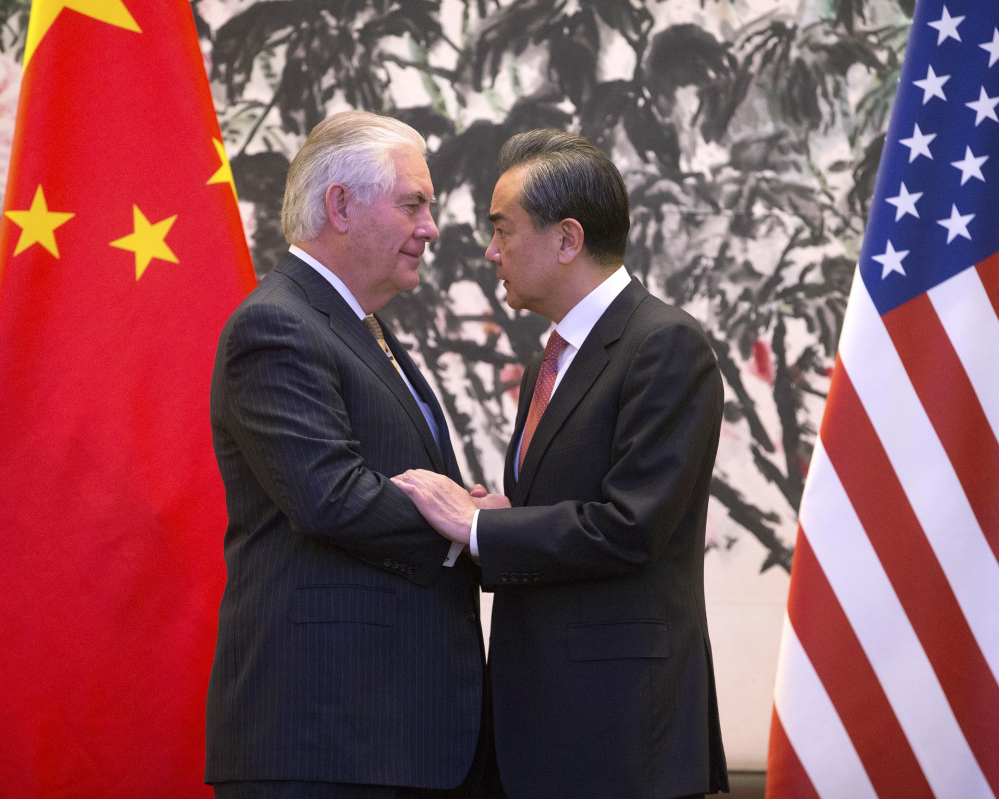
A MINNOW AMONG GIANTS
Tillerson in China as risk of bilateral tension rises over North Korea

As America’s top diplomat arrives in Beijing, one issue looms larger than any other: North Korea.
Despite underlying strategic tensions, officials insist the relationship between Donald Trump and Xi Jinping remains rosy. This is partly because Beijing has been more willing to turn the screws on North Korea in the past six months that it has over the previous six years.
But the Middle Kingdom is reluctant to totally isolate Kim Jong-un. August data shows China imported 1.6 million tonnes of North Korean coal—the largest monthly figure since February. Chinese corn and rice exports also rose sharply.
The high stakes are heaping pressure on the US-China relationship. Beijing is concerned that Washington might decide to enact unilateral sanctions on Chinese banks doing business with North Korea; China Merchants Bank and state-owned Agricultural Bank of China have been named by the chair of the House Foreign Affairs Committee. Such measures would undoubtedly trigger retaliatory moves, sparking fears of a tit-for-tat trade war between the world’s two largest economies.
Mr Tillerson has his work cut out for him. He must seek assurances that China will bring its full weight to bear on Pyongyang, while also preserving cordial ties lest the world’s most important relationship turns hostile.
Delve deeper: Beyond Armageddon: US policy options on North Korea
SYRIAN BEDFELLOWS
Russian and Turkish Heads of State meet in Ankara

Turkish President Recep Tayyip Erdogan hosts Russia’s Vladimir Putin in Ankara today, as the two heads of state seek closer bilateral ties and regional co-operation.
Discussion is likely to centre on the implementation of de-escalation zones agreed to in the latest round of Astana talks, which will see around 1500 observers from Turkey, Russia and Iran, deployed to a newly created Idlib zone for 6 months. Idlib is in the northeast of the country and home to over one million civilians.
The Iraqi Kurdistan independence referendum will also feature prominently in today’s discussions. Turkey will not tolerate any status change along its southern border, and Erdogan has stated that it would undertake punitive air and border actions and cut the flow of oil out of northern Iraq in support of that policy. Erdogan is wary of a similar situation occurring in Syria and will undoubtedly petition Putin to ratchet up actions against Syrian Kurdish rebel groups.
While Russia’s focus remains preserving the Assad regime as the dominant party in any peace process, expect Turkey to continue agitating for action against Syrian Kurds, a point it will further press when meeting with Iran on Monday.
Delve deeper: The Future of Rojava
A GRAVE ADDRESS
Plight of the Rohingya taken before the UN Security Council

UN Secretary-General Antonio Guterres is addressing the Security Council today on violence in Myanmar after seven of the 15-member council requested a briefing on what the UN has called a textbook example of ethnic cleansing.
Rakhine state is in the throes of a military crackdown that has displaced more than 430,000 people into Bangladesh since August. Fleeing from the violence is the ethnic Rohingya, a Muslim minority within Buddhist Myanmar.
Despite the dire situation, the UN’s ability to pressure Ms Suu Kyi into action is hamstrung by division in the Security Council. Mindful of dissident Muslim minorities within their own states and wary of intervention, China and Russia have argued the crisis is a domestic issue and provided a shield for Myanmar from council resolutions. However, with a worsening humanitarian situation and Guterres’ championing of the cause that support has waned.
It is unlikely that China and Russia will support adopting any Security Council resolution without a significant deterioration in the situation. However, expect today’s briefing to result in a toughening of language from the council, condemning the violence and calling on Myanmar to stop the flow of refugees.
Delve deeper: The Rohingya refugee crisis: ethnic cleansing in Myanmar
HAPPENING ELSEWHERE…
Tensions in Iraq, Japan’s parliament dissolves, Uber fights back

Amid rising tensions, the Kurdish Regional Government in northern Iraq is expected to announce the official results from Monday’s nonbinding independence referendum. Local media suggest an overwhelming majority of voters supported the ‘yes’ campaign. Iraq’s central government told foreign diplomats to leave the Kurdish capital of Erbil yesterday, while lawmakers asked for troops to be sent to Kirkuk—an oil-producing hub claimed by the Kurds. Watch this space.
Japanese Prime Minister Shinzo Abe will officially dissolve the lower house of parliament today in preparation for snap elections, which are most likely to be held on October 22.
Uber’s lawyers will deliver their closing arguments in an appeal against a decision not to renew the company’s license to operate in London. London’s transport regulator says Uber does not conduct adequate background checks on its drivers and has a dubious record on reporting serious crimes. The ride-hailing firm is expected to argue that its service is merely a communication medium between drivers—who are self-employed—and customers.

